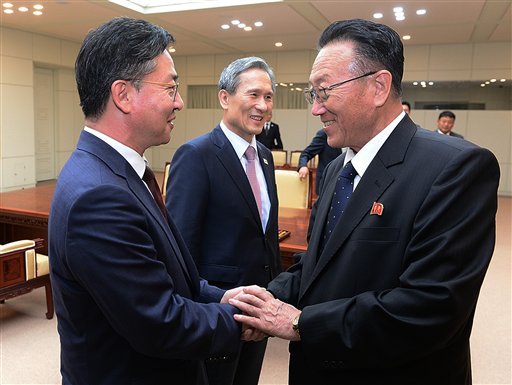North, South Korea agree to defuse crisis after marathon talks

In this photo provided by the South Korean Unification Ministry, South Korean Unification Minister Hong Yong-pyo, left, shakes hands with Kim Yang Gon, right, a senior North Korean official responsible for South Korean affairs, as South Korean presidential security adviser Kim Kwan-jin looks on after their meeting at the border village of Panmunjom in Paju, South Korea, Tuesday, Aug. 25, 2015. THE SOUTH KOREAN UNIFICATION MINISTRY VIA AP
SEOUL–North and South Korea reached agreement Tuesday, following marathon talks, on ending a tense military stand-off that had pushed the two rivals to the brink of armed conflict.
In a joint accord, the North “expressed regret” over recent mine blasts that maimed two South Korean soldiers, while the South agreed to switch off loudspeakers blasting propaganda messages across the border.
The speakers will be silenced at midday (0300 GMT) Tuesday, at which time the North will lift a “semi-war state” declared last week by leader Kim Jong-Un.
The two also agreed to work toward a resumption next month of reunions for families separated by the 1950-53 Korean War, and to hold official talks in either Seoul or Pyongyang at a date to be decided.
The agreement, which appeared to cover the major areas of contention, came after days and nights of grueling negotiations that began early Saturday evening in the border truce village of Panmunjom.
Article continues after this advertisementThe talks had played out against a dangerous military stand-off, which included a rare artillery exchange over the border last week, and saw both sides ramping up the military rhetoric and flexing their weaponry.
Article continues after this advertisementTensions continued to rise while the discussions were on, with South Korean and US jets flying simulated bombing runs, and North Korea reportedly deploying two thirds of its 70-vessel submarine fleet.
‘New momentum’
UN Secretary-General Ban Ki-moon “warmly welcomed” the accord, which was also published in full by the North’s official KCNA news agency.
South Korea’s lead negotiator, National Security Adviser Kim Kwan-Jin, said the agreement would settle the current crisis and provide a “new momentum” for inter-Korean relations in the future.
Kim described North Korea’s expression of regret for the mine blasts as “very meaningful” and said securing it had taken up most of the time in his negotiations with his North Korean counterpart Hwang Pyong-So–a close confidant of leader Kim Jong-Un.
“We had to get a word of apology that has the North as the main agent,” Kim said.
Pyongyang has repeatedly denied any responsibility for the mine blasts, and Tuesday’s accord avoided any explicit acceptance of responsibility.
But analysts said it came far closer than they had expected.
A ‘clear’ apology
“Past inter-Korea agreements at a time like this have tended to be extremely ambiguous,” said Jeung Young-Tae, an analyst at the Korea Institute for National Unification in Seoul.
“But in the world of diplomatic language, this is a clear apology, with the object of the regret–the landmine blasts that maimed the soldiers–clearly stated,” Jeung said.
Kim Kwan-Jin also noted that the South’s commitment to ending the broadcasts was conditional on the absence of any “abnormal” events–an apparent reference to future North Korean provocations.
“We had to insist on that because otherwise another provocation may take place, posing a threat to public safety and national security,” Kim said.
The agreement will be welcomed by neighboring countries like China and Japan, which had viewed the stand-off on the Korean peninsula with growing concern and urged both sides to show calm and restraint.
It will also be viewed with some relief by the United States, which has nearly 30,000 US troops permanently stationed in South Korea and had repeatedly reiterated its commitment to the defense of its key Asian ally.
“As with all such agreements, the devil is in the details,” said Yang Moo-Jin, a professor at the University of North Korean Studies in Seoul.
“But it clearly represents a turnaround for the current crisis and shifts the pendulum towards dialogue,” Yang said.
Technically, the two Koreas have been at war for the past 65 years since the 1950-53 Korean War ended with a ceasefire that was never ratified by a formal peace treaty.–Jung Ha-Won
RELATED STORIES
North Korea doubles artillery at border, deploys 50 subs—Seoul